Global events of 2020 have made us think about many things from a very different perspective, with many industries being compelled to innovate through difficult times. We have looked back on our own long history and have found many similarities to historical events. Our Managing Director, David Robinson, had this to say:
Although the future impact of global events in 2020 is not yet known, we are all just starting to realise that it might profoundly affect all of our lives. Was the demand for seeds driven by concerns about food availability; worries about going out to shops; or was it just something to do during lockdown? Whatever the motivation, our challenge was to try and meet the demand. This challenge became even greater when a number of our highly experienced staff had to self-isolate and the need for ‘social distancing’ in the warehouse meant that we had to do more work, with fewer people.
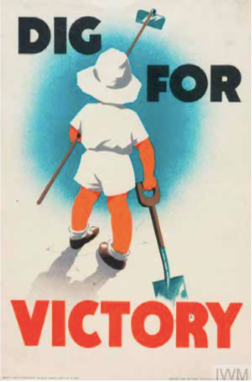
This isn’t the first time since our company was founded in 1806 that Suttons has experienced a period of increased demand at the same time as a reduction in staff. With the 75th anniversary of VE day approaching, several of our customers have reminded us of the times when the British public were asked to ‘Dig for Victory’. Whilst, of course, there are parallels, it wouldn’t be right to draw them too closely. The current circumstances are extremely distressing for many but in contrast, during WWI, Leonard G Sutton, who ran the flower seed department at the time, lost four of his five sons and nearly lost the fifth.
During both World wars, the supply of seeds for people to grow their own vegetables was seen as a vital part of the war effort. Throughout 1915 it became increasingly clear how important the seed industry was, as the requirement for vegetable seeds increased. On 30th December 1915, the seed-growing industry was designated on the list of “reserved occupations vital to the war effort”. Indeed, some staff were disqualified from National Service because the Board of Agriculture considered “the services they are rendering to the country by remaining at work cannot be dispensed with”. Demand for seeds was such that the non-enlisted staff weren’t able to despatch orders fast enough and volunteers were asked to work all through the night (with windows painted out and lights shaded to hide from Zeppelin airship raids).
The adversity led to a delay in processing orders. In February 1917, our archives show 9,000 outstanding orders which took up to 12 days to despatch. By February 1918 this had grown to 22,000 orders which took a month to despatch. This resulted in high numbers of complaints about delays in receiving orders, peaking at “over 50 letters a day!” As a comparison, this year the sudden surge in orders led to a peak in early April of 54,000 outstanding orders which were taking up to 12 days to despatch, although this had reduced back to 10,000 outstanding orders by the end of April, generally being despatched within 5 days. As a sign of the times, with emails so much easier to write than letters, by mid-April, this led to a peak of over 2,000 customer emails a day, generally asking for delivery updates.
Impressively, despite the inevitable disappointment at having to wait for seed deliveries, the vast majority of our customers have been remarkably understanding and polite throughout… Gardeners really are a nice bunch of people!
In March 1918, in recognition of the work done by the company it was announced that his Majesty, King George V, accompanied by Her Majesty, Queen Mary, were to pay a visit to “The Royal seed establishment” to “inspect the work that it is being done in connection with the food supply of the country”. Staff were advised “on the entry of the King and Queen into your department you should at once stand up for a moment and then return to your usual work”
Throughout WWII Suttons continued to supply seeds. The Ministry of Agriculture promoted a ‘Dig for Victory’ campaign with everyone being encouraged to grow their own food to supplement their diet during a time of harsh rationing. Open spaces everywhere, from domestic gardens to public parks – even the lawns outside the Tower of London, were turned into vegetable patches.
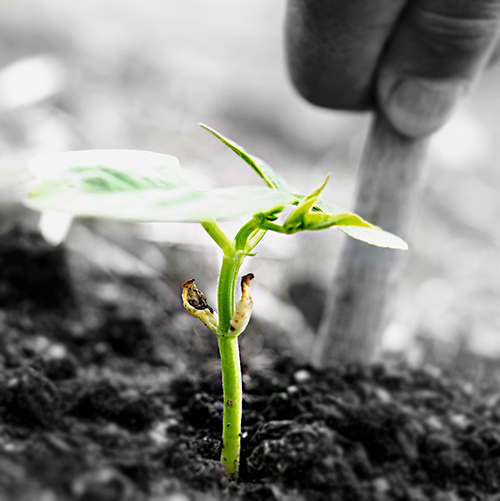
With food imports reduced as a result of the U boat blockade, the Dig for Victory campaign was essential to keep the country fed, throughout the war and indeed afterwards.
It was appreciated right at the start of the war that home vegetable growing would become more important, so vegetable seeds took the place of flowers on the front of the 1938 Suttons catalogue for the very first time. The ordering of seed potatoes and vegetable seeds was started earlier than usual in anticipation of potential shortages and increased prices as the War progressed. Seed packing was also carried out early in preparation for potential labour shortages.
Although Suttons continued supplying seeds throughout the war, it was at times difficult to source sufficient seeds. On 12th March 1942, order acknowledgements stated that the company had run out of “runner beans, onions, leeks, cress and early potatoes and that orders could not be delivered in under 3 weeks”.
Once the War was over, life didn’t return to normal. The country was bankrupt, and unable to resume food imports at pre-war levels so rationing continued long after the war only finally ending in 1954. Bread rationing in fact only started in 1946, after the war. In many ways, food supply was worse on the home front after the war was won, so for many the need to continue growing food at home was a necessity.
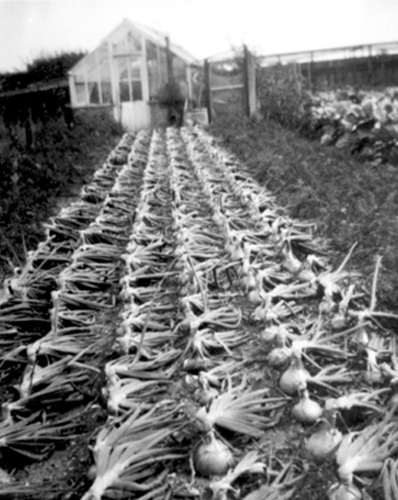
By 1945, despite paper being in short supply, the government gave Suttons permission for 130,000 catalogues to be printed provided it was predominantly a food production catalogue.
During the global events of 2020, it has become increasingly clear that we are living through unprecedented times which will be discussed for many years to come. It’s hard to know when or how it will end and whilst there are parallels between current circumstances and wartime, there are also many differences. Staff at risk have been asked to work from home or take time off rather than being sent off to fight a war! In 1938, Suttons set up a ‘decontamination squad’ in case of gas attack and although we haven’t had to go quite as far as the picture below, we do now have a plan for ‘deep cleaning’ our premises.
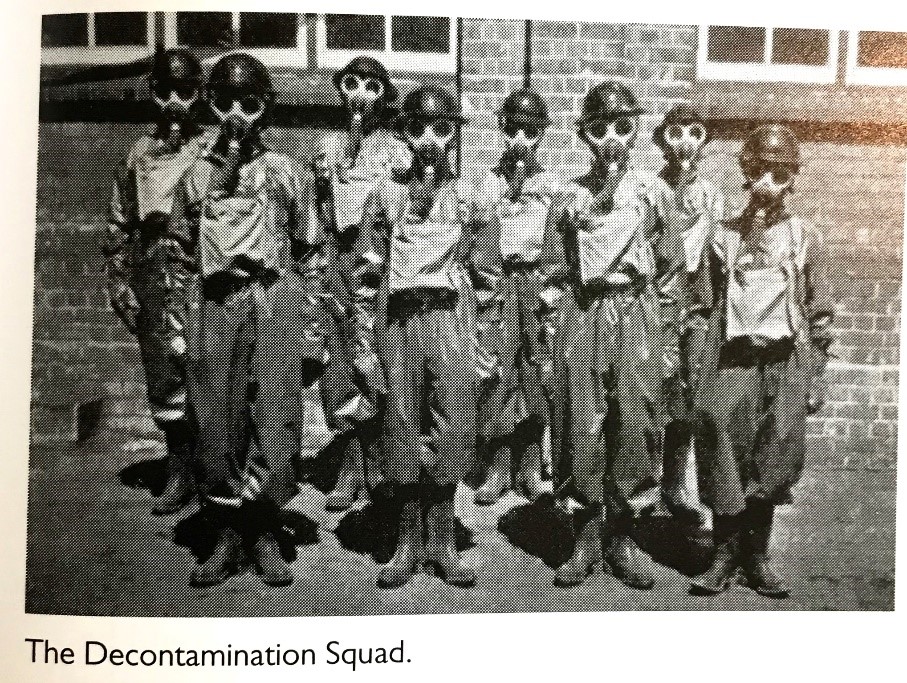
In 1945, a catalogue was essential to illustrate the products available and all orders were sent via the post. This year we cancelled our usual April catalogue because of the circumstances but we now have the internet, so we were still able to display products and take orders online.
Requirements for seeds grew steadily through both World Wars. This current circumstance has seen our sales grow rapidly over just a period of weeks. Like our colleagues during both wars we are coping with reduced staff numbers which, like then, has led to order delays and increases in customer communications. The ease of sending a quick email has led to a much greater increase in customer enquiries, with over 50,000 emails received and answered in April alone!
The longer-term implications are yet to be known. The second world war and the slow recovery afterwards created a generation of vegetable growers. Over the years, busier lifestyles; the ease of shopping; the year round availability of fruit and vegetables from all around the world and instantly available fast food at the touch of a keypad have created a generation who are largely detached from the origins of their food. We have seen many new customers buying seeds from us for the very first time. Hopefully, it proves to be more than just wishful thinking that one small silver lining from our current problems will be the creation of a new generation of gardeners who grow and enjoy their own food and pass their new found skills onto the next generation.
Share Your Story
To recognise everyone’s efforts both today and in times past, we would love for you to share what the ‘Dig for Victory’ campaign means to you. This could include any stories or photographs of parents or grandparents and what they remember from Dig for Victory. Or it may be your own personal endeavor to become self-sufficient, educate children, or to simply look after the health of your body & mind, with some gentle “gardening” exercise during this time. We’ve respectfully named these categories “Then” & “Now”.
Your stories will be shared and an ‘album’ will be created on our blog to celebrate.
Last Updated on November 30, 2022 by Suttons Horticultural Team

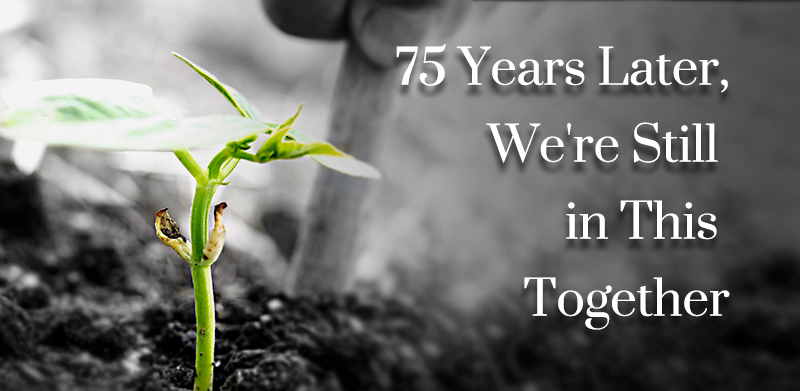


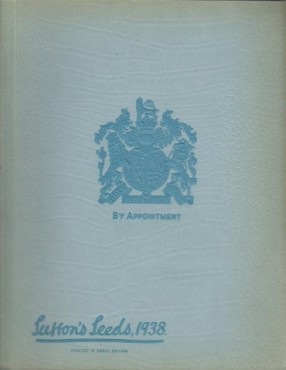
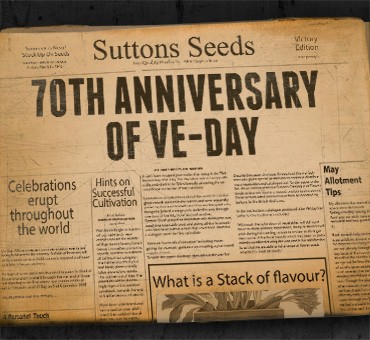
Please answer,
My plants, £300 worth which the vast majority have yet to arrive with delivery dates of the 26th April is a really frustrating position to be in so can someone explain why.
If I do not receive them very soon or a reasonable reply I will cancel the order and go to my local garden centre.
Rgds, Paul
Please answer,
My plants, £300 worth which the vast majority have yet to arrive with delivery dates of the 26th April is a really frustrating position to be in so can someone explain why.
If I do not receive them very soon or a reasonable reply I will cancel the order and go to my local garden centre.
Rgds, Paul